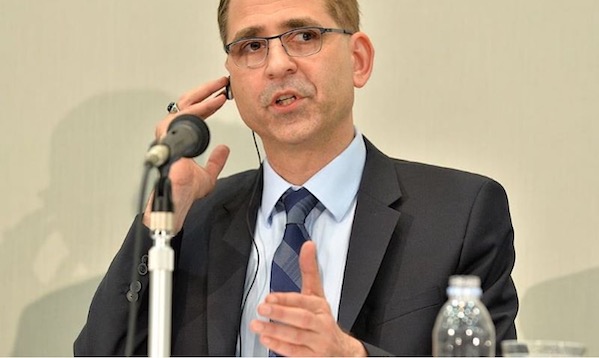’ Seagen CEO talks about his next stop, Pfizer deal and the ADC landscape
June 10, 2023
Source: drugdu
 518
518

David Epstein’s short tenure as Seagen’s CEO will likely end soon with the antibody-drug conjugate specialist’s sale to Pfizer. After a rich career spanning companies of various sizes, Epstein is keeping an open mind about where he might head next.“I will hopefully make new drugs somewhere else,” Epstein said in a recent interview on the sidelines of the American Society of Clinical Oncology's annual meeting. “I don’t know where that will be.”
Throughout his time in biopharma, Epstein has worn many hats. He’s known for building Novartis’ oncology unit and leading the Swiss giant’s larger global pharma business. He fostered startups for five years at Flagship Pioneering before taking the reins at Seagen in November.
Those roles have given him experience in almost every therapeutic area and in both drug development and commercialization. That kind of resume opens a lot of possibilities—although going back to Flagship isn’t his plan right now.
“I want to see interesting science that can substantially improve people’s lives,” Epstein said of his ideal future role. “I’d want to work with people that have that same desire and goal and where I can help people be successful. And that could be anywhere, any location—doesn’t really matter to me.”
“I don’t have a checklist,” Epstein added. “I just have to see what’s available, and there’s no rush,” Epstein said, noting that he didn’t originally identify Seagen as a potential career stop.
The timing of Epstein’s appointment and the subsequent Pfizer merger agreement might have created the impression that the longtime Novartis exec was recruited to strike a sale after Merck bowed out. But Epstein said that wasn’t the case.
“One can’t just wish to sell a company, and then magically, it happens overnight,” Epstein said.
Seagen wasn’t sending pitches to potential buyers at the time, Epstein noted. Instead, it was Pfizer CEO Albert Bourla who reached out to Seagen Chairman Felix Baker, Ph.D., after the J.P. Morgan Healthcare Conference in January and expressed Pfizer’s renewed interest in Seagen.
When Baker interviewed Epstein for the Seagen CEO job, he asked the candidate how he’d expand Seagen’s marketed portfolio, develop next-generation antibody-drug conjugates (ADCs) and take them global, all while building Seagen into a world-class oncology company, Epstein said.
“The main focus was to make sure I was committed to the long term,” he said.
But after taking the Seagen CEO job in November, Epstein helped execute the Pfizer sale in March. He collected a $57.5 million pay package during his short time at Seagen last year, a securities filing recently showed.
Seagen's ADC footprint
Seagen’s existing ADC programs have their share of competitors. For disitamab vedotin, the obvious competitor is Enhertu. But because the two drugs use different chemotherapies as their cancer-killing payloads, Seagen is positioning its med for use sequentially behind Enhertu. That Enhertu-relapsed setting is still a blockbuster opportunity, according to Epstein.
Meanwhile, CD30-targeted Adcetris, currently Seagen’s top-selling drug, is under threat from Bristol Myers Squibb’s PD-1 inhibitor Opdivo. A phase 3 recently showed that Opdivo was better than Adcetris at staving off cancer progression in newly diagnosed stage 3 or 4 classical Hodgkin lymphoma, according to data presented at ASCO 2023.
But the trial has yet to show whether Opdivo extends patients’ lives, which is the gold standard in evaluating a cancer drug’s efficacy. Adcetris, for its part, boasts the National Comprehensive Cancer Network’s highest recommendation because of a favorable overall survival showing against chemo. Besides, Seagen is exploring combining Opdivo with Adcetris and has already shown some encouraging tumor response data, Epstein noted.
Padcev, used in combination with Merck’s Keytruda, looks on track to replace Adcetris and become Seagen’s best-selling drug after a recent FDA accelerated approval in patients with newly diagnosed bladder cancer that’s ineligible for cisplatin-based chemotherapy.
Looking forward, the phase 3 EV-302 trial, which tests the combo in first-line patients regardless of their cisplatin eligibility, will likely determine the full extent of Padcev’s commercial potential. That study is expected to read out later this year.
Seagen also has ladiratuzumab vedotin, a LIV-1-targeted ADC that’s partnered with Merck.
As for drugs that Seagen has full control in the U.S., the company has identified three priority pipeline programs: disitamab vedotin for stomach and breast cancers, integrin beta-6-directed SGN-B6Aa for non-small cell lung cancers and other tumor types, and an anti-B7-H4 candidate for breast and gynecological cancers.
Moving forward, Epstein predicts that ADCs will become more effective and less toxic and that they will be used earlier in treatment sequences and in more combinations.
“In many places where standard chemo is used will be replaced with ADCs and patients will have longer lives because of it,” Epstein said. “That’s partially where we’re gonna go in this field.”
Reference: https://www.fiercepharma.com/pharma/seagen-ceo-david-epstein-his-next-stop-pfizer-acquisition-and-adc-competition
By editorRead more on
- The first subject has been dosed in the Phase I clinical trial of Yuandong Bio’s EP-0210 monoclonal antibody injection. February 10, 2026
- Clinical trial of recombinant herpes zoster ZFA01 adjuvant vaccine (CHO cells) approved February 10, 2026
- Heyu Pharmaceuticals’ FGFR4 inhibitor ipagoglottinib has received Fast Track designation from the FDA for the treatment of advanced HCC patients with FGF19 overexpression who have been treated with ICIs and mTKIs. February 10, 2026
- Sanofi’s “Rilzabrutinib” has been recognized as a Breakthrough Therapy in the United States and an Orphan Drug in Japan, and has applied for marketing approval in China. February 10, 2026
- Domestically developed blockbuster ADC approved for new indication February 10, 2026
your submission has already been received.
OK
Subscribe
Please enter a valid Email address!
Submit
The most relevant industry news & insight will be sent to you every two weeks.



